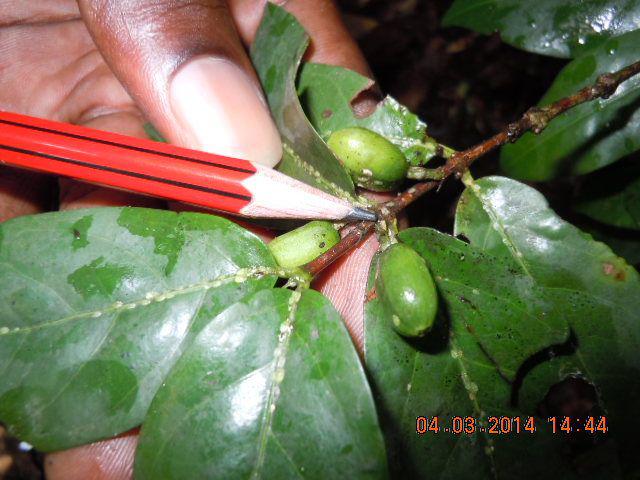Alfan A. Rija
Other projects
21 Sep 2015
Improving Efficiency of Ranger Patrols in Detecting and Preventing Poaching in Serengeti National Park and Adjacent Reserves
We aim to generate basic ecological knowledge by examining seed predators and their effects on seed survival and plant recruitment in the area.
The wild coffee, Coffea kihansiensis is a critically endangered, and a recently (2004) described species located in the Kihansi gorge ecosystem, in Southern Udzungwa Mountains, Tanzania. The Kihansi River which underpins the hydrological balance of the ecosystem was diverted underground in 1999, for hydropower production to supply electricity to the national power grid. Only small volume of water was left to flow naturally along the river course. The diversion caused spray-maintained habitats to wither, with dire catastrophic effects to several animal and plant species in the gorge ecosystem.

Aphids on coffee.
Immediate drastic effects of the diversion were first observed on the Kihansi spray toad Nectophrynoides asperginis, which only after a few years of commencing power production it was declared extinct in the wild. Human-induced disturbances such as wild fires, poaching of wild animals and extraction of timber products have also remained persistent to the ecosystem due that the area is not protected by law. Several effects of the changed hydrologic regime on the coffee species observed post-river diversion include plant wilt and parasites attacks. Parasites infestation has far-reaching effects on the physiological and reproductive process of the plant species while predation on mature seeds may reduce seed germination and plant recruitment in the area. The combined effect of these factors on coffee population dynamics is currently unknown, as is its basic biological information in the area. Any conservation initiatives for this species are likely to be thwarted in the absence of this knowledge that would lead to informed conservation decisions.
Our objectives are to, determine main seed predators of this species, examine predation effects on seed formation and survival and examine the role of post-dispersal seed predation on plant recruitment in the forest. We will use various field experiments to collect data across the species breeding cycle, covering both dry and wet seasons, to understand how these factors may influence population performance of the endangered coffee. Our work will be a vehicle for conservation of this particular species and other biota inhabiting Kihansi ecosystem.